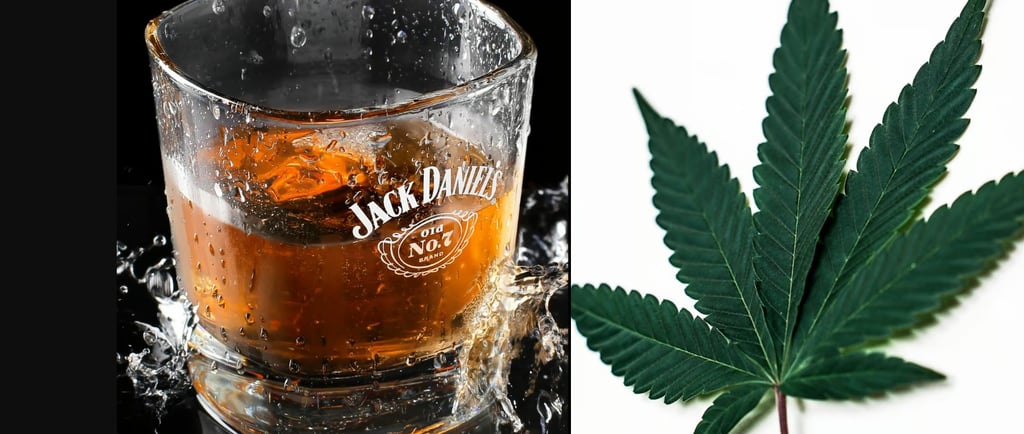How Legal Cannabis Is Reshaping the Alcohol Industry: A Growing Shift in Consumer Habits
As marijuana legalization expands across the U.S. and beyond, alcohol companies like the parent of Jack Daniel’s are feeling the impact. Learn how shifting consumer behavior, changing health perceptions, and global trends are putting pressure on the spirits industry and fueling cannabis market growth.
CANNABIS LEGALIZATION
7/10/20252 min read


How Legal Cannabis Is Reshaping the Alcohol Industry
The legalization of marijuana is no longer just a policy debate—it’s now a powerful market force reshaping industries, particularly alcohol. The CEO of Brown-Forman Corporation, the parent company of Jack Daniel’s and Woodford Reserve, recently acknowledged a growing challenge: cannabis is becoming a popular alternative to alcohol, and it’s cutting into their profits.
During a recent earnings call, CEO Lawson Whiting pointed to three major factors affecting the industry’s sales: generational shifts, the rise of weight loss drugs, and increased cannabis use. Brown-Forman reported a 5% drop in net sales, and Whiting noted that although tighter consumer budgets are a factor, cannabis legalization cannot be ignored.
“We’d be naive if we didn’t say that there isn’t some pressure coming from those [factors],” Whiting admitted.
While Europe is experiencing similar consumption trends, Whiting highlighted that the cannabis effect is unique to regions like the U.S., where marijuana legalization is spreading rapidly across state lines.
In a press release, the company listed “further legalization of marijuana” as a clear business risk due to changing consumer behaviors and shifting preferences. As cannabis becomes more widely accepted and accessible, traditional alcohol consumption is facing stiff competition.
The Data Doesn’t Lie
Multiple studies and surveys confirm this trend:
Gallup found Americans view marijuana as less harmful than alcohol, tobacco, and nicotine vapes.
A YouGov poll revealed most Americans believe regular alcohol use is more harmful than cannabis.
A federally funded study found that people who use marijuana before drinking tend to drink less and report fewer cravings.
In Canada, where marijuana is federally legal, beer sales have declined, supporting the “substitution effect.”
Another survey published in the journal Addiction found more adults in the U.S. now use marijuana daily than drink alcohol daily.
A particularly striking figure from Bloomberg Intelligence predicts that cannabis users will outnumber alcohol drinkers by nearly 20 million over the next five years, while the alcohol industry is expected to lose a few million customers.
Young adults are leading the shift. A recent study showed that 3 out of 4 young adults substitute cannabis for alcohol at least once a week. In fact, marijuana is also replacing cigarettes and painkillers for many users.
A Fast-Evolving Landscape
With U.S. cannabis sales expected to hit $37 billion by 2027, and legalization spreading to new states, alcohol companies face increasing pressure to adapt. The alcohol industry is being forced to reimagine its strategy in response to evolving health awareness and a growing appetite for cannabis products.
As Whiting put it, Brown-Forman is focusing on “agility, innovation, and a clear focus on execution” to navigate these changes. But with public perception continuing to shift in favor of marijuana, the challenge will only grow.
Final Thoughts
The rise of cannabis isn’t just a cultural moment—it’s a market shift with lasting impact. As consumer habits evolve and the legal cannabis industry matures, alcohol companies may have to innovate or diversify to remain competitive. For now, it’s clear: marijuana is no longer just a recreational alternative—it’s a direct rival.
Get in touch
Contacts
754-346-4421
book@drboorstein.com
